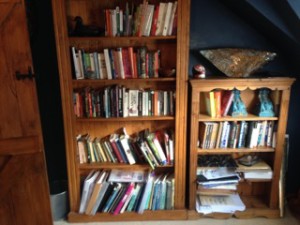The Vault Blog Tour – Karen Long Q&A
Karen Long was born and raised in the English midlands, educated at Bangor University and taught English and Drama for fifteen years. During her teaching years she studied biology and neurology with the Open University and this interest in medicine, forensics and forensic psychology is reflected in her writing. She is an enthusiastic traveller and has spent time in Toronto, which became the backdrop and inspiration for (debut novel) The Safe Word.
She is a keen amateur naturalist with a deep and abiding love for the crow family. She has dedicated time, love and several fingers in an effort to rehabilitate crows, magpies, rooks and ravens.
Karen is happy to correspond with readers and can be contacted through her website  KarenLongWriter.com, where she posts regular blogs.
KarenLongWriter.com, where she posts regular blogs.
Karen has very kindly agreed to round off her blog tour for The Vault by taking part in a small Q&A session. Having read the above author biography there were a couple of things mentioned that piqued my curiosity. I would not normally open a post with a biography, however, some of my questions will make a bit more sense if you are armed with the same facts that I had!
With this in mind my opening gambit was to ask if Karen could bring us up to speed:
Eleanor Raven is introduced in The Safe Word. While I was able to read and enjoy The Vault without having read The Safe Word, there are clearly elements of the first story still impacting upon Eleanor at the start of The Vault. Can you briefly set the scene?
The Safe Word is set six months earlier. When murder victims begin to appear in the city, presented as macabre artistic installations, it’s Eleanor Raven’s job to get inside the killer’s head and understand his motivations and message. This journey takes her into the dark heart of Toronto’s BDSM scene; a world she is no stranger to. It’s her need for dangerous sexual encounters that lead her to the killer’s studio, where she is to become his final masterpiece. Surviving this encounter has left her with physical and mental scars, which are affecting her relationships, self-control and ultimately her ability to do her job.
I enjoyed the squad-room scenes in The Vault and there seems a good team dynamic between Eleanor and her colleagues (though relations are strained in one area). Do you consider Eleanor to be a rebellious element within the squad or is she misunderstood, perhaps due to her intellect and her ability to think ‘outside the box’?
Eleanor is less a rebel and more of a maverick. She’s not out to overthrow, rather her thoughts and actions keep her on the periphery of the establishment. Her colleagues see her as being uniquely able to see the hidden connections and truths behind events but like Cassandra, she lacks the social skills that would allow her to convince those she needs to. Everyone is very supportive and respectful of her insight and methods but she is her own worst enemy, on so many levels. I think all truly good fictional detectives are pariahs of some flavour.
Raven is pitting her wits against an adversary she dubs The Collector and through the book we follow the progress of her investigation. The reader gets to know who The Collector is and we follow his story as he tries to juggle his crimes with his day-to-day routine. Which did you have most fun writing – the investigation or the criminal activities? And which was easier to write?
Constructing a criminal mind and letting their actions weave a story plot is fabulous fun. The psychopaths I write about in my novels have very clear ideas on love, integrity and, in particular, family. What they lack, but don’t recognise or acknowledge, is the ability to empathise with any other living being, other than themselves. For me that is a truly terrifying concept and just playing around with those sort of thought process, can make you feel very uncomfortable. But writing characters that lack moral structure can only entertain on a very superficial level. What I really enjoy is how the behaviour of one individual shapes the mind of another. Eleanor constantly battles the damage wrought on her psyche by the destruction created by the killers she hunts. It is that investigation which is the most satisfying to write. Creating and analysing the uniqueness of a character’s mind that ultimately sheds light on one’s own.
As I carefully try to avoid plot spoilers…there are detailed discussions on the decomposition of a corpse and ways that this process could be slowed. Do you enlist specialist advice when writing about technical processes or do you fall back on personal research?
I saw Gunther von Hagan’s ‘Bodyworlds’ exhibition twice and was bowled over by the beauty and complexity of the human form. Part of the pleasure was reading as much as I could on how it was achieved. I have always been fascinated by decomposition and autopsy and had been following the work at Dundee University being championed by a collective of crime writers, particularly Val McDermid, on developing a new form of post-mortem preservation that keeps the body soft and retains natural colours. I had long conversations with Practitioners and although I have seen postmortems I was not granted permission to witness an embalming. So, I would say that all the science I write about is researched as thoroughly as I can, however I’m not writing a scientific paper and do have to blur the edges and take artistic licence sometimes.
I have asked this question in the past of other crime authors but everyone has a different opinion: Why do you think that we all seem to enjoy reading about serial killers?
It is one of the defining aspects of the conscious mind that we seek to understand the mind of another. Have you not said to a loved one, “What are you thinking?”, “Penny for them?” or you see the personality and empathy in a pet? We look for the similarities and fear the differences. A great white shark is more terrifying than an orca, both are apex predators, roughly the same weight but we feel less threatened by the orca (count the ratio of shark to orca documentaries on the Discovery channel). It looks back at us with an intelligence and complexity of purpose that we believe we can understand. It’s more like than unlike us. The unconscious mind is terrifying; simple motor responses that can’t be tempered or reversed by logic, emotion or negotiation leave us vulnerable and afraid. Those atavistic fears, tamped down by collective intelligence and analysis need an airing if we are to survive. What better way to practise than from the safety of your own living room, protected by hearth, locks and a telephone. When we confront the serial killer in the safety of our imaginations, we look into the shark’s mind. It is a lesson in survival that dares us to look into a mind devoid of reason.
You are a resident of Shropshire, yet your novels are set in Toronto. May we assume that you have enjoyed spending some time in Canada?
I did spend some but not enough, time in Toronto. I loved it! It’s liberal, eclectic and full of contradictions and because I was on a film set at the time I had the opportunity to visit some of the less touristy area. All of the specific ‘event’ locations in my novels have been visited and investigated, including the seedy nightclubs! I live on the periphery of a very small rural village, lacking either a shop or pub, I don’t think we have enough residents here to inspire a ‘Miss Marple’
Does a Canadian setting allow greater flexibility for story lines and plot devices than you would have with an English based character?
Absolutely! I have a tendency to get bogged down by the details both logistical and scientific. It’s very liberating to take a flavour of a place and then mould it to accommodate your storyline. I would spend most of my writing hours driving around, seeing if a scene were possible, if I set my novels here. My productivity is poor to abysmal at best, so I’m grateful to be using my memories and Google maps to get it written.
We have Eleanor Raven and your author biography makes frequent references to crows: how do crows and ravens come to play such a significant part of your life?
I am obsessed with corvids. They are smart, deliciously mean and bad tempered. I think my first encounter was as a child listening to ‘Arabel’s Raven’ read by Bernard Cribbins on Jackanory. So, when I had an opportunity to save one, I jumped at it and on it. Mortimer filled my house with cunning plots, malicious intent and bird shit and I loved it. Since then I’ve kept ravens, rooks, magpies and crows. For me they are ‘other’, I can understand their motivations to an extent but have no comprehension of what it’s like to ‘be’ them. Perhaps that’s how I see Eleanor, an otherness, like a person but ultimately a construct of my own imagination.
Are you currently working on the next outing for Eleanor Raven or have you plans to change focus?
I’m working on book three called, ‘The Cold Room’ and hope to have a five book series before trying something different.
When do you find time for writing? Are you a night owl or do you need to put aside time through the day?
Unfortunately, due to a love of reading and wine consumption I am very much a daytime writer. My youngest daughter is at school during the day, which means I can think, write and not have to jump to the dulcet sound of ‘Mom!’ every ten minutes.
If we were to sneak a peek at your bookshelves what could we expect to see?
Forensics, science, novels (mainly crime fiction and classics no sci fi), text books and I love photography collections.
To prove this Karen has also sent me pictures of her bookcases (they are distressingly clutter free).
My most sincere thanks to Karen Long for her time and assistance making this leg of her Blog Tour possible. I would also like to extend my thanks to @crimebookclub for the behind the scenes magic.
